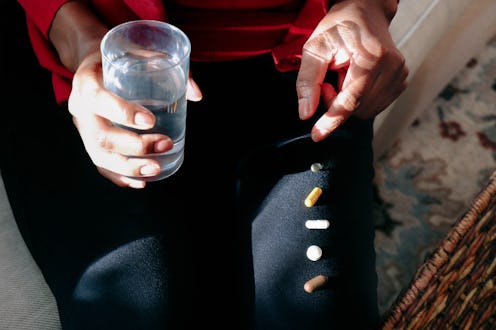Health
Dry January Isn’t An Automatic Immunity Boost, Experts Say
A month-long break is very short in the grand scheme of things.

For many, the new year comes with an increased desire to start fresh. Given that the COVID-19 pandemic saw a surge in drinking, some people might be using this January as an opportunity to get that particular habit in check. Drinking less is never a bad lifestyle habit to take up, and this year is as important as ever to stay healthy, right? That’s why you might want to know if Dry January can affect your immune system.
How Drinking Affects Your Immune System
According to Dr. Swana de Gijsel, MD, an internist in New York City, drinking can impact your body’s immune function in various ways. “Alcohol disrupts immune pathways by affecting our innate and adaptive immune systems, as well as the composition of the gut microbiota (microbiome) and the gut barrier function,” she explains. “Through these mechanisms, alcohol can impair the body’s ability to defend against infections like pneumonia or sepsis, contribute to organ damage associated with alcohol consumption (such as liver disease), and impede recovery from tissue injury (i.e. delayed wound healing).”
An increase in alcohol sales at the height of the pandemic prompted the World Health Organization to warn the public, particularly at-risk adults, to refrain from overdoing the booze, since drinking may increase the risk of serious COVID-19 complications, in addition to compromising the immune system.
While research is limited when it comes to the connection between COVID-19 infections and alcohol, research has shown that drinking can increase the chance of adverse outcomes from respiratory illnesses due to lung and digestive system damage, in addition to harming cells needed for immune function. Heavy alcohol use — defined as eight or more drinks for women, according to the CDC — can also damage the cells on the surface of the lungs and make them less capable of fighting off infections, says Dr. Soma Mandal, MD, a board-certified internist at Summit Medical Group in Berkeley Heights, New Jersey. “Alcohol can impact and weaken the immune system, but according to the WHO, this is especially true for heavy drinkers,” Dr. Mandal says.
Sleep is another important factor for your immune system’s ability to fight off illnesses, and if you’ve ever crashed immediately after a night out, you know how drinking can mess with your sleep. Too much missed sleep, or regularly getting poor quality sleep, can certainly increase your risk of getting sick, according to Mayo Clinic. Once you cut out the booze, you’ll likely soon see improvements in sleep quality, says Mandal, and find that you’re better able to ward off sicknesses like the common cold, as well as recover more quickly if you do get sick.
Can Going Sober Improve Your Immune System?
Since regularly imbibing can weaken your immune system, you’d think that cutting back would ultimately help to boost it. One 2018 study in Hepatology showed immune function can improve after abstaining from alcohol for a year.
“Significant alcohol intake can inhibit your immune system, specifically, a type of white blood cell called monocytes, which help fight off infections,” adds Dr. Mandal. “Not drinking for a month, on the other hand, allows your body to begin recovery from such conditions.”
Still, research is limited as to how much going sober will kickstart that recovery (and how quickly), or if it’ll simply not cause any more damage to your immune system. Behavior changes like drinking less are part of a set of habits that can support your immune system doing its job. In the end, a month off drinking won't make you totally immune to all disease — because that's not how your (very complicated!) immune system works, anyway — but it does go a long way to promote your overall health.
Experts
Dr. Soma Mandal, MD
Study Cited
Li, W., Amet, T., Xing, Y., Yang, D., Liangpunsakul, S., Puri, P., Kamath, P. S., Sanyal, A. J., Shah, V. H., Katz, B. P., Radaeva, S., Crabb, D. W., Chalasani, N., & Yu, Q. (2017). Alcohol abstinence ameliorates the dysregulated immune profiles in patients with alcoholic hepatitis: A prospective observational study. Hepatology (Baltimore, Md.), 66(2), 575–590. https://doi.org/10.1002/hep.29242